- Home
- Daniel Defoe
Robinson Crusoe (Penguin ed.)
Robinson Crusoe (Penguin ed.) Read online
ROBINSON CRUSOE
DANIEL DEFOE was a Londoner, born in 1660 at St Giles, Cripplegate, the son of James Foe, a tallow-chandler. Daniel changed his name to Defoe about 1695. He was educated for the Presbyterian Ministry at Morton’s Academy for Dissenters at Newington Green, but in 1683 he abandoned this plan and became a hosiery merchant in Cornhill. After serving briefly as a soldier in the Duke of Monmouth’s rebellion, he became well established as a merchant and travelled widely in England, as well as on the Continent. Between 1697 and 1701 he served as a secret agent for William III in England and Scotland, and between 1703 and 1714 for Harley and other ministers. During the latter period he also, single-handedly, produced the Review, a pro-government newspaper. A prolific and versatile writer, he produced some 500 books on a wide variety of topics, including politics, geography, crime, religion, economics, marriage, psychology and superstition. He delighted in role-playing and disguise, a skill he used to great effect as a secret agent, and in his writing he often adopted a pseudonym or another personality for rhetorical impact. His first extant political tract (against James II) was published in 1688, and his bestselling satirical poem The True-Born Englishman, appeared in 1701. Two years later he was arrested for The Shortest Way with the Dissenters, an ironical satire on High Church extremism, committed to Newgate and pilloried. He turned to fiction relatively late in life and in 1719 published his great imaginative work Robinson Crusoe. This was followed in 1722 by Moll Flanders and A Journal of the Plague Year, and in 1724 by his last novel, Roxana. His other works include A Tour Thro’ the Whole Island of Great Britain, a guide-book in three volumes (1724–6; abridged Penguin edition, 1965), The Complete English Tradesman (1725–7), Augusta Triumphans (1728), A Plan of the English Commerce (1728) and The Compleat English Gentleman (not published until 1890). He died on 24 April 1731. Defoe had a great influence on the development of the English novel and many consider him to be the first true novelist. All his novels are published in Penguin Classics.
JOHN RICHETTI is A. M. Rosenthal Professor of English at the University of Pennsylvania. Among his books are Popular Fiction before Richardson: Narrative Patterns 1700–1739 (1969), Defoe’s Narratives: Situations and Structures (1975), Philosophical Writing: Locke, Berkeley, Hume (1983) and The English Novel in History: 1700–1780 (1999). He is currently editing the Restoration and Eighteenth Century volume of the forthcoming Cambridge History of English Literature.
DANIEL DEFOE
Robinson Crusoe
Edited with an Introduction and Notes by
JOHN RICHETTI
PENGUIN BOOKS
PENGUIN BOOKS
Published by the Penguin Group
Penguin Books Ltd, 80 Strand, London WC2R 0RL, England
Penguin Putnam Inc., 375 Hudson Street, New York, New York 10014, USA
Penguin Books Australia Ltd, Ringwood, Victoria, Australia
Penguin Books Canada Ltd, 10 Alcorn Avenue, Toronto, Ontario, Canada M4V 3B2
Penguin Books India (P) Ltd, 11 Community Centre,
Panchsheel Park, New Delhi – 110 017, India
Penguin Books (NZ) Ltd, Private Bag 102902, NSMC, Auckland, New Zealand
Penguin Books (South Africa) (Pty) Ltd, 24 Sturdee Avenue,
Rosebank 2196, South Africa
Penguin Books Ltd, Registered Offices: 80 Strand, London WC2R 0RL, England
First published 1719
This edition published in Penguin Classics 2001
Reprinted 2003
1
Editorial material copyright © John Richetti, 2001
All rights reserved
The moral right of the editor has been asserted
Except in the United States of America, this book is sold subject
to the condition that it shall not, by way of trade or otherwise, be lent,
re-sold, hired out, or otherwise circulated without the publisher’s
prior consent in any form of binding or cover other than that in
which it is published and without a similar condition including this
condition being imposed on the subsequent purchaser
EISBN: 978–0–141–90105–3
CONTENTS
Chronology
Introduction
Further Reading
Note on the Text
Robinson Crusoe
Glossary
Notes
CHRONOLOGY
1660
Born in London (exact date unknown), son of James Foe and Alice Foe
1662
The Act of Uniformity passed. The Foes followed the lead of their minister, Samuel Annesley, and left the Church of England to become Presbyterian dissenters
1665–6
The Plague and the Great Fire of London
c. 1671–9
Attended school of the Revd James Fisher at Dorking, Surrey, and then the Dissenting Academy of the Revd Charles Morton, Newington Green, north of London
c. 1683
Established as a hosiery merchant in London, living in Cornhill, near the Royal Exchange
1684
Married Mary Tuffley and received a dowry of £3,700
1685–92
Fought in the rebellion against King James II led by the Duke of Monmouth. Prosperous businessman dealing in hosiery, tobacco, wine and other goods. Travels extensively on business in England and also in Europe
1688
James II forced to abdicate and William of Orange becomes William III of England
1692
Declared bankrupt for £17,000 and imprisoned for debt
1694
Established a brick and tile factory at Tilbury, in Essex
1695
Began to call himself De Foe
1697
First published book, An Essay on Projects, a series of proposals for radical social and economic changes
1697–1701
Agent for William III in England and Scotland
1701
The True-Born Englishman, a poetic satire of xenophobia and a defence of the (Dutch) King William III
1702
Death of William III and the accession of Queen Anne. The Shortest Way with the Dissenters, a satiric attack on High Church extremists
1703
Arrested for writing the satiric pamphlet The Shortest Way with the Dissenters, charged with sedition, committed to Newgate Prison and sentenced to stand in the pillory for three days. Published the poem A Hymn to the Pillory and an authorized collection of his writings. Released through the influence of the powerful politician Robert Harley, but his brick and tile factory fails while he is in prison. Bankrupt again
1704–13
Secret agent and political journalist for Harley and other ministers; travelled widely in England and Scotland promoting the union of the two countries. Wrote single-handedly what was first called A Weekly Review of the Affairs of France and later A Review of the State of the English Nation, a pro-government news sheet appearing as often as three times a week
1707
Union of England and Scotland
1710
Tories come to power
1713–14
Arrested several times for debt and for his political writings but released through government influence
1714
Death of Queen Anne and the accession of George I, Elector of Hanover; fall of Robert Harley and the Tory government
1715
The Family Instructor, the first of Defoe’s conduct books
1719
Robinson Crusoe, The Farther Adventures of Robinson Crusoe
1720
Memoirs of a Cavalier, Captain Singleton, Serious Reflections…of Robinson Crusoe
1722
Moll Flanders, Religious Courtship, A Journal of the Plague Year, Colonel Jack
1724
Roxana, A General History of the Pyrates, A Tour Thro’ the Whole Island of Great Britain (3 volumes, 1724–6)
1725
The Complete English Tradesman (volume II in 1727)
1726
The Political History of the Devil
1727
Conjugal Lewdness, An Essay on the History and Reality of Apparitions, A New Family Instructor
1728
Augusta Triumphans, A Plan of the English Commerce
1729
The Compleat English Gentleman (not published until 1890)
1731
Died 24 April in Ropemaker’s Alley, London, in debt, hiding from creditors
INTRODUCTION
When Robinson Crusoe appeared in April 1719, Daniel Defoe was fifty-nine years old. Although he had begun his adult life as a businessman and ambitious entrepreneur, bankruptcy and imprisonment for debt in 1692 had forced him to turn to his pen to support his large family (he and his wife had seven children). In the first two decades of the eighteenth century, he had produced an astonishing amount of writing as poet, political and economic pamphleteer, historian, moralist and jack-of-all-trades journalist. Defoe is remembered (vaguely) by posterity as the man who wrote Robinson Crusoe, but that classic represents an entirely unrepresentative fraction of his voluminous literary production. As a professional writer struggling to earn a living in those years, Defoe was in the thick of new developments that look forward to modern mass print media: the emergence in London at the beginning of the eighteenth century of a substantial market-place for reading matter and a large audience hungry for print, for books, pamphlets and newspapers in unprecedented quantities. Whatever Robinson Crusoe has become for its millions of readers since Defoe’s day, he wrote it like everything else he produced in his long career as a writer to sell in that market to that new audience in the emerging culture of printed matter. Robinson Crusoe must be one of the most popular books ever written, reprinted continuously and translated into many languages (one estimate is that by the end of the nineteenth century it had appeared in at least seven hundred editions, translations and imitations). Defoe’s hero is instantly and universally recognized in his goatskin clothes, an archetype of modern heroic individualism and self-reliance – the man surviving alone on a deserted island. But for all that enduring and universal appeal, Defoe’s book grows out of the early-eighteenth-century English world of the new market-place for print in which its author earned a precarious living.
Defoe was born in the autumn of 1660 in the parish of St Giles, Cripplegate, just north of the old City of London. His father James Foe (as the family was known) was a tallow-chandler, a merchant who manufactured and sold candles made from animal fat, a trade at which he prospered and rose to be an eminent merchant in the City. In 1662 the Foes and the congregation they belonged to followed their pastor, Samuel Annesley, and became Dissenters, non-conforming Protestants (Presbyterians), separate from the established Church of England which had demanded what many people considered unacceptably strict adherence to its principles by the Act of Uniformity promulgated that year. The Foes belonged to the solid middle tier of the merchant class that Napoleon was thinking of a century later when he called England a nation of shopkeepers. Defoe had a privileged, quite comfortable childhood in this prosperous and pious household. The young Daniel received his higher education at one of the best of the so-called academies established for the children of prosperous Dissenters, who were by law deprived of most civil rights and therefore excluded from attending the universities at Oxford and Cambridge. Defoe entered Charles Morton’s academy in Newington Green in 1674, and the excellent education provided there was probably better and certainly more useful than the traditional curriculum based largely on classical literature at the old universities. Morton was an Oxford-trained clergyman and scholar (who later became president of Harvard College), and his students were instructed in English (rather than in Latin) in the traditional subjects but also in modern languages and modern science and philosophy, including Locke’s Essay concerning Human Understanding (1690), then banned at Oxford.
Defoe’s biographers have concluded that he had serious thoughts in 1681 of becoming a clergyman, but after what seems to have been a crisis in his faith and in his commitment to such a career he decided instead to go into business. That choice, those alternative careers, will continue to resonate in all of Defoe’s writing, where the sometimes conflicting (although often complementary) demands of religion and commerce, piety and secular ambition, share the stage and occupy the thoughts of both author and characters. Instead of a minister, Defoe became a wholesale merchant in stockings, a hosier, part of the expanding trade in manufactured clothing, a growth industry in those days as domestic production of wearing apparel began to give way to mass production. He dealt extensively in wine and tobacco as well, and he travelled widely in England and perhaps to the Continent during the mid 1680s. Defoe had large ambitions as a businessman, and he seems to have played recklessly for high stakes in land speculation. Legal records indicate that he was involved in eight law suits in those years. By 1692, thanks to serious losses of cargo at sea during the war with France, he was bankrupt for the immense sum of £17,000 (in modern purchasing power more than £500,000 or $750,000), and the closing years of the seventeenth century found him surviving by various odd occupations and government posts: he served as one of the trustees of the government lottery in 1695 and 1696, and from 1695 to 1699 he was accountant for the government duty on glassware and bottles. In 1694 he opened a brick and roof tile factory in Tilbury, east of London, on the Thames, which seems to have prospered and allowed him to pay off many of his debts and to set up as a substantial householder in the London suburbs. In 1697 he published his first book, An Essay on Projects (a collection of proposals for radical social and economic reforms such as a rational banking system, a national highway commission, improvements in social welfare and in female education). From that point on the sheer quantity of Defoe’s literary production is extraordinary, thousands and thousands of pages on every conceivable subject in a wide variety of forms and formats. During the early years of the eighteenth century, he was an active political pamphleteer, defending the policies of his hero, King William III, the Dutch Prince of Orange, who had succeeded to the throne upon the forced abdication of his brother-in-law, James II, in 1688. By 1703, Defoe became virtually a full-time writer and in the years that followed one of the most prominent (for his enemies, notorious) journalists and political writers (and poets) of the time. He seems to have been employed by William’s government to defend their policies, and he was certainly a paid political writer and operative by the time Queen Anne succeeded William in 1702.
A transforming event in Defoe’s early life as a writer came in 1703 when he was arrested for publishing the previous year a satirical attack on conservative, High Church extremists who wished to intensify the suppression of religious nonconformity. The Shortest Way with the Dissenters parodies the High Church position at its most radical and violently intolerant, concluding with the exhortation to ‘crucifie the Thieves…let the Obstinate be rul’d with the Rod of Iron’. The government saw the pamphlet as inflammatory, seditious in its effects rather than merely ironic, and Defoe was arrested and eventually sentenced to stand in the pillory (a contraption that held in place a man’s head and arms and often enough exposed him to the sometimes fatal physical abuse of the spectators) for three days and to serve an indefinite jail term. He spent six months in Newgate prison, and when he emerged, thanks to a pardon obtained through the influence of Robert Harley, the Speaker of the House of Commons, his brick and tile factory had failed and he was bankrupt for the second time. He became an informant and secret agent for Harley, and his production as a writer was from then on prolific in its extent and variety. Most remarkable of all was A Weekly Review of the Aff
airs of France, Purged from the Errors and Partiality of News-Writers and Petty Statesmen of all Sides, a thrice weekly political news and commentary sheet that Defoe produced single-handedly from 1704 through 1713. In addition, he turned out in these years a stream of other journalism, more political polemics, a book-length verse treatise on government, Jure Divino (1706), a satirical political allegory, The Consolidator (1705), a long history of the recent political union of England and Scotland, The History of the Union (1709), and two works on what we would call economics, An Essay upon Public Credit and An Essay upon Loans (1710).
Nominally a Whig, Defoe was employed by the Tory Harley, and his support of Harley’s government’s efforts when it came to power in 1710 to end the war with France provoked attacks from those who saw him as a turncoat. Something like a crisis for Defoe and possibly for the nation arrived in 1713. Queen Anne had no surviving children, and by the terms of the Act of Settlement promulgated when James II was forced to abdicate, the throne was to bypass the Stuart Pretender, James (Queen Anne’s brother), in exile at the French court and go to the Elector of Hanover in Germany. The Stuarts had considerable support in England, and the Jacobite (after Jacobus, Latin for James) threat was real and urgent as the Queen was unlikely to produce an heir. Defoe quickly wrote several inflammatory anti-Jacobite pamphlets, including An Answer to a Question that Nobody thinks of, viz. But What If the Queen Should Die? (1713), whose ironies were not understood or appreciated. Once again, his enemies managed to have him arrested. It took a pardon from the Queen (obtained by the ministry) to free him.

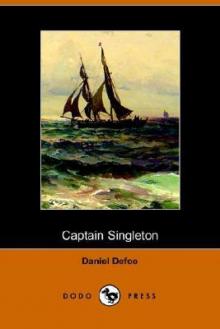 Captain Singleton
Captain Singleton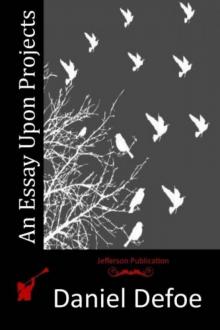 An Essay Upon Projects
An Essay Upon Projects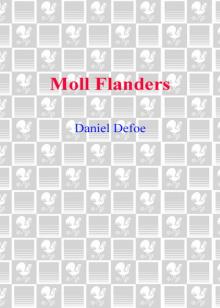 Moll Flanders Moll Flanders Moll Flanders
Moll Flanders Moll Flanders Moll Flanders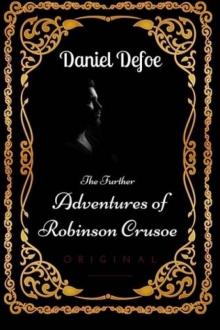 The Further Adventures of Robinson Crusoe
The Further Adventures of Robinson Crusoe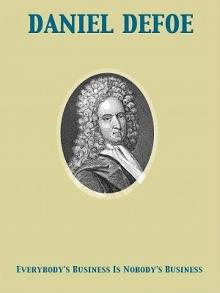 Everybody's Business Is Nobody's Business
Everybody's Business Is Nobody's Business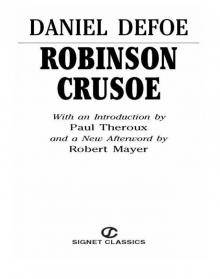 Robinson Crusoe
Robinson Crusoe The Storm
The Storm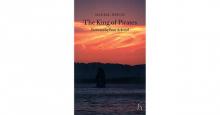 The King of Pirates
The King of Pirates History of the Plague in London
History of the Plague in London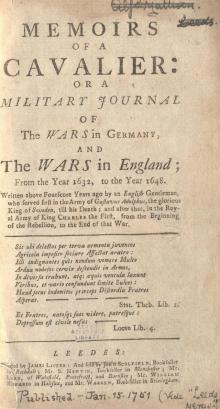 Memoirs of a Cavalier
Memoirs of a Cavalier_preview.jpg) The Life and Most Surprising Adventures of Robinson Crusoe, of York, Mariner (1801)
The Life and Most Surprising Adventures of Robinson Crusoe, of York, Mariner (1801)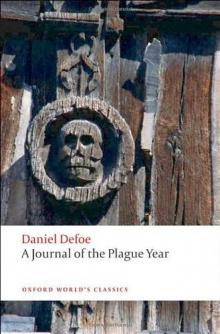 A Journal of the Plague Year
A Journal of the Plague Year_preview.jpg) The Life and Adventures of Robinson Crusoe (1808)
The Life and Adventures of Robinson Crusoe (1808)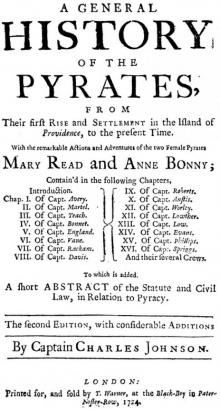 A General History of the Pyrates: / from their first rise and settlement in the island of Providence, to the present time
A General History of the Pyrates: / from their first rise and settlement in the island of Providence, to the present time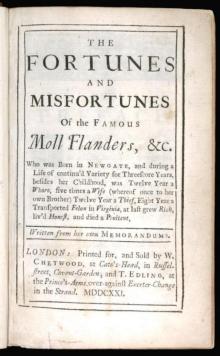 The Fortunes and Misfortunes of the Famous Moll Flanders
The Fortunes and Misfortunes of the Famous Moll Flanders_preview.jpg) The Fortunate Mistress (Parts 1 and 2)
The Fortunate Mistress (Parts 1 and 2)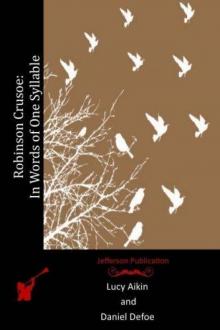 Robinson Crusoe — in Words of One Syllable
Robinson Crusoe — in Words of One Syllable From London to Land's End
From London to Land's End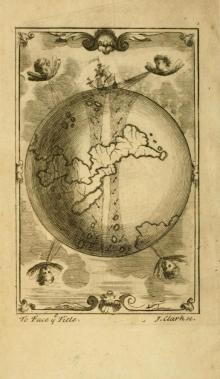 A New Voyage Round the World by a Course Never Sailed Before
A New Voyage Round the World by a Course Never Sailed Before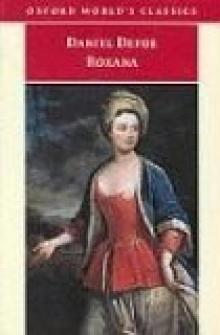 Roxana
Roxana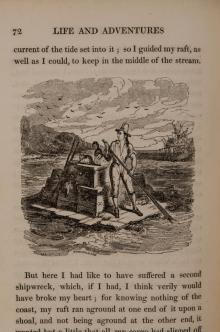 The Life and Adventures of Robinson Crusoe of York, Mariner, Volume 1
The Life and Adventures of Robinson Crusoe of York, Mariner, Volume 1_preview.jpg) Memoirs of Major Alexander Ramkins (1718)
Memoirs of Major Alexander Ramkins (1718)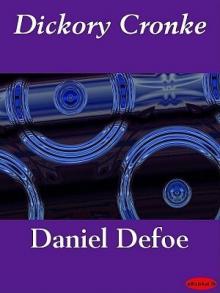 Dickory Cronke
Dickory Cronke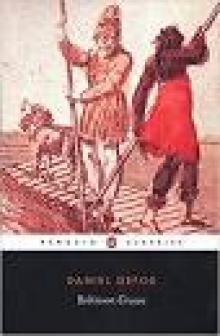 Robinson Crusoe (Penguin ed.)
Robinson Crusoe (Penguin ed.)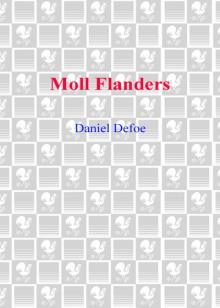 Moll Flanders
Moll Flanders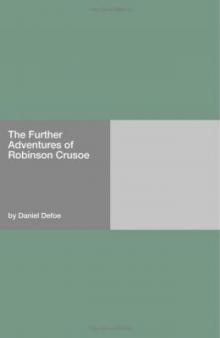 The Further Adventures of Robinson Crusoe rc-2
The Further Adventures of Robinson Crusoe rc-2